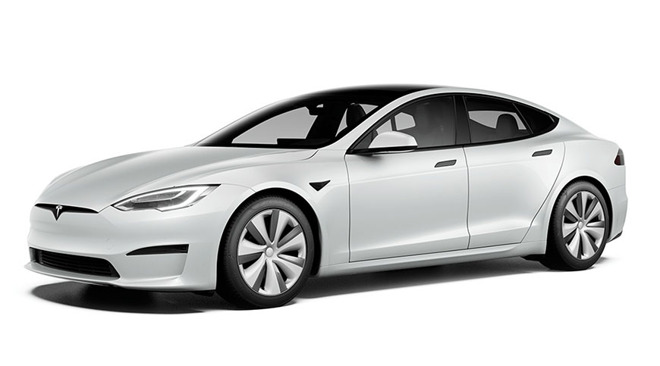Future Tesla models could integrate Apple CarKey with UWB tech
A Federal Communications Commission document unearthed this week reveals electric carmaker Tesla is working to build Ultra Wideband technology into future vehicles, potentially signaling upcoming adoption of Digital Key protocols like Apple's CarKey.

In September, Tesla filed documents detailing two key fobs, a security controller, and "endpoints" designed to reside in a car's frame or cabin, reports The Verge. At least three of the devices support UWB.
The key fob document notes compatibility with standards-based UWB, suggesting interoperability with implementations deployed in Apple devices like iPhone. If the endpoints are also UWB compliant, the system could theoretically support a smartphone-based Digital Key.
Apple, along with a consortium of tech and automotive companies, has been developing Digital Key Release 3.0, which taps Bluetooth Low Energy (BLE) and UWB technology to deliver passive, location-aware keyless access. Depending on their location, Tesla's endpoints could provide the ranging information necessary for triangulating a user's position relative to a vehicle. Ranging is part of Digital Key Release 3.0's security backbone which thwarts breaches like relay attacks that attempt to jam or intercept digital key signals.
So far, BMW is the only manufacturer to officially announce support for Digital Key Release 3.0 and, more specifically, Apple's next-generation UWB-enabled CarKey tech. Called Digital Key Plus, BMW's version allows users to unlock and start their car without taking iPhone out of a bag or pocket. That experience is an improvement over the existing BMW Digital Key that requires users to hold iPhone up to a door handle to gain entry and subsequently place the device in a provided Qi-enabled smartphone tray to start the vehicle.
Apple introduced UWB to its product line with the U1 chip in iPhone 11 and subsequently built the silicon into the iPhone 12 and Apple Watch Series 6 series in 2020.

In September, Tesla filed documents detailing two key fobs, a security controller, and "endpoints" designed to reside in a car's frame or cabin, reports The Verge. At least three of the devices support UWB.
The key fob document notes compatibility with standards-based UWB, suggesting interoperability with implementations deployed in Apple devices like iPhone. If the endpoints are also UWB compliant, the system could theoretically support a smartphone-based Digital Key.
Apple, along with a consortium of tech and automotive companies, has been developing Digital Key Release 3.0, which taps Bluetooth Low Energy (BLE) and UWB technology to deliver passive, location-aware keyless access. Depending on their location, Tesla's endpoints could provide the ranging information necessary for triangulating a user's position relative to a vehicle. Ranging is part of Digital Key Release 3.0's security backbone which thwarts breaches like relay attacks that attempt to jam or intercept digital key signals.
So far, BMW is the only manufacturer to officially announce support for Digital Key Release 3.0 and, more specifically, Apple's next-generation UWB-enabled CarKey tech. Called Digital Key Plus, BMW's version allows users to unlock and start their car without taking iPhone out of a bag or pocket. That experience is an improvement over the existing BMW Digital Key that requires users to hold iPhone up to a door handle to gain entry and subsequently place the device in a provided Qi-enabled smartphone tray to start the vehicle.
Apple introduced UWB to its product line with the U1 chip in iPhone 11 and subsequently built the silicon into the iPhone 12 and Apple Watch Series 6 series in 2020.


Comments
Hyundai has already been using Digital Key, but their version is only available on Android and based on the older 2.0 release, not the newer 3.0.
https://www.cnet.com/roadshow/news/2020-hyundai-sonata-digital-key-new-york-auto-show/
He did it this for the cameras of a Belgium tv station. He contacted Tesla all so, for which he received reward from the company.
The app would always be there for additional functionality when needed, but for the vast majority of the time, I just need to get in the car and go.
Yes, you get that now with the existing bluetooth key functionality. Like Mike1 said, you just walk up to the car, get in and go. Maybe there's additional security with the digital key concept, but that hasn't been clearly explained.